It isn't uncommon to use agar agar as a substitute, but what happens when it's an agar agar substitute that you need? Thankfully, there are many vegan-friendly and gluten free alternatives to choose from that are easy to swap in, whether you're baking a sweet treat or whipping up a savory sauce.
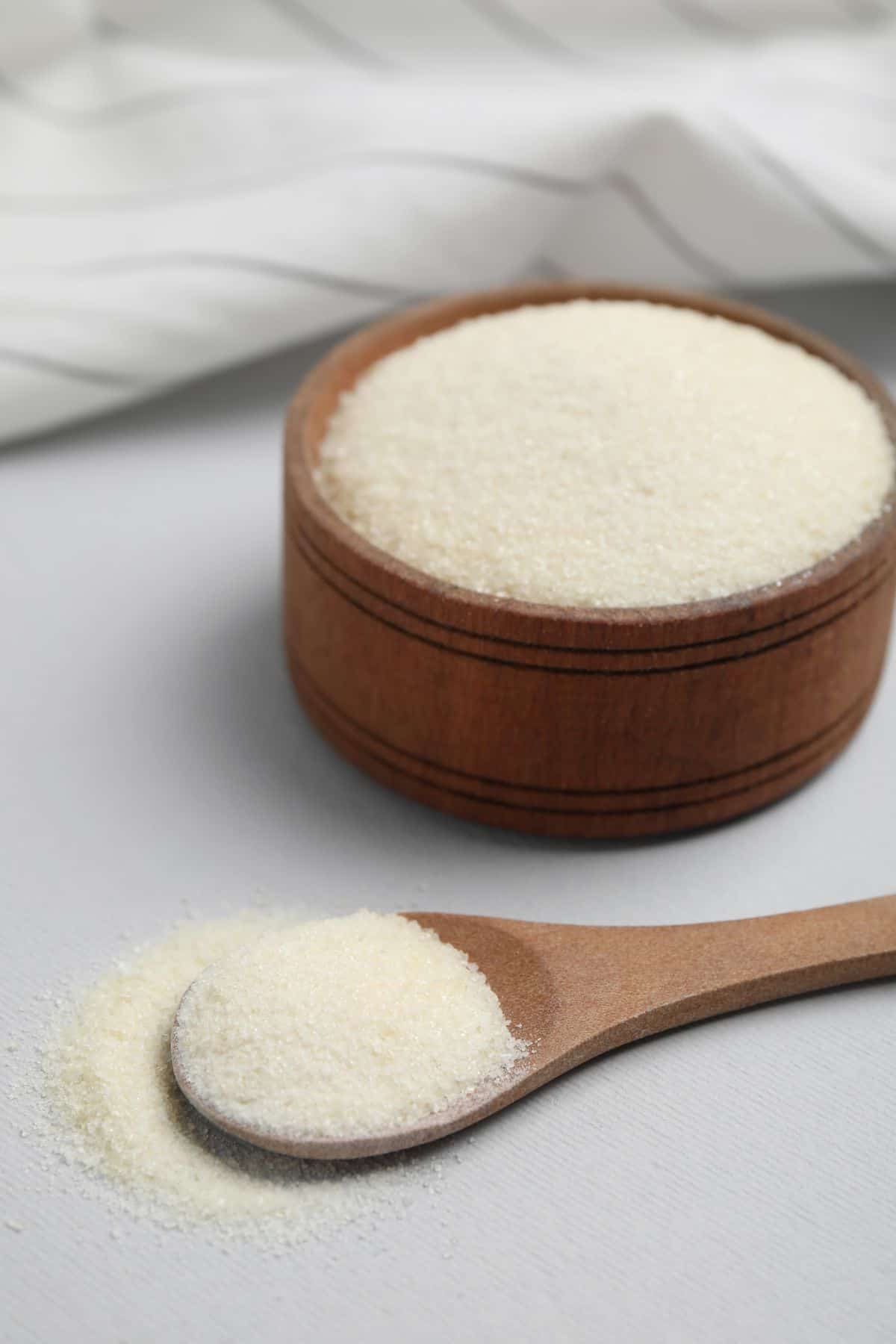
Jump to:
- 📖 What is agar agar powder?
- 📖 Is agar agar same as gelatin?
- 📖 What is agar agar used for?
- 🌟 When not to use agar agar?
- 👩🍳 What can I use instead of agar agar?
- 1. Cornstarch
- 2. Arrowroot Powder
- 3. Tapioca Starch
- 4. Pectin Powder
- 5. Xanthan Gum
- 6. Guar Gum
- 7. Carrageenan Powder
- 8. Vegan Jel
- 9. Unflavored Gelatin Powder
- ❓ Agar agar alternatives FAQs
- 🎓 Conclusions on the best substitute for agar agar
- More baking guides
- The BEST Agar Agar Substitute
📖 What is agar agar powder?
Agar agar powder is a flavorless, gluten-free, and 100% plant-based thickening agent made from red algae (a type of seaweed). You cannot consume agar agar powder directly. However, once you mix it with water, boil it, and cool it, you can use the gelatin-like product to stabilize, thicken and provide texture to various products.
You can usually find agar agar powder or agar agar flakes in the baking aisle of your neighborhood grocery store or specialty stores such as Asian supermarkets, natural food stores, or health food stores. You can also find it agar agar on Amazon. In addition to its powder form, agar agar comes in strips and flakes.
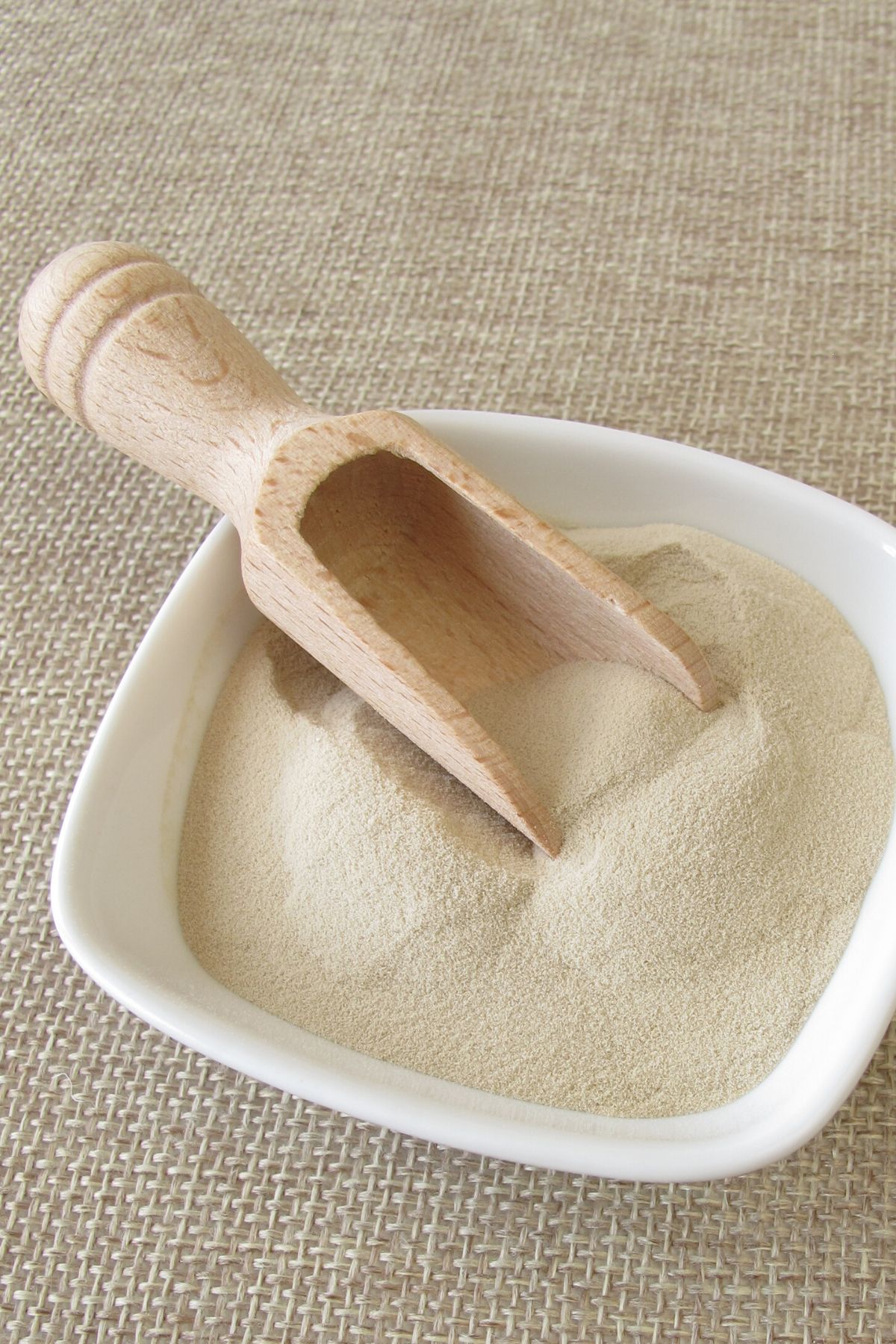
📖 Is agar agar same as gelatin?
Agar agar works similarly to gelatin in that it thickens, stabilizes, and emulsifies various food products. However, while agar agar is 100% plant-based, gelatin is derived from animal collagen, making it unsuitable for vegans and vegetarians or those cooking for vegans or vegetarians.
Agar agar is also much more potent and has a higher gel-like consistency, so you should refrain from substituting it at a 1:1 ratio for gelatin. Depending on the brand agar agar can be 8x stronger than average no flavored gelatin powder.
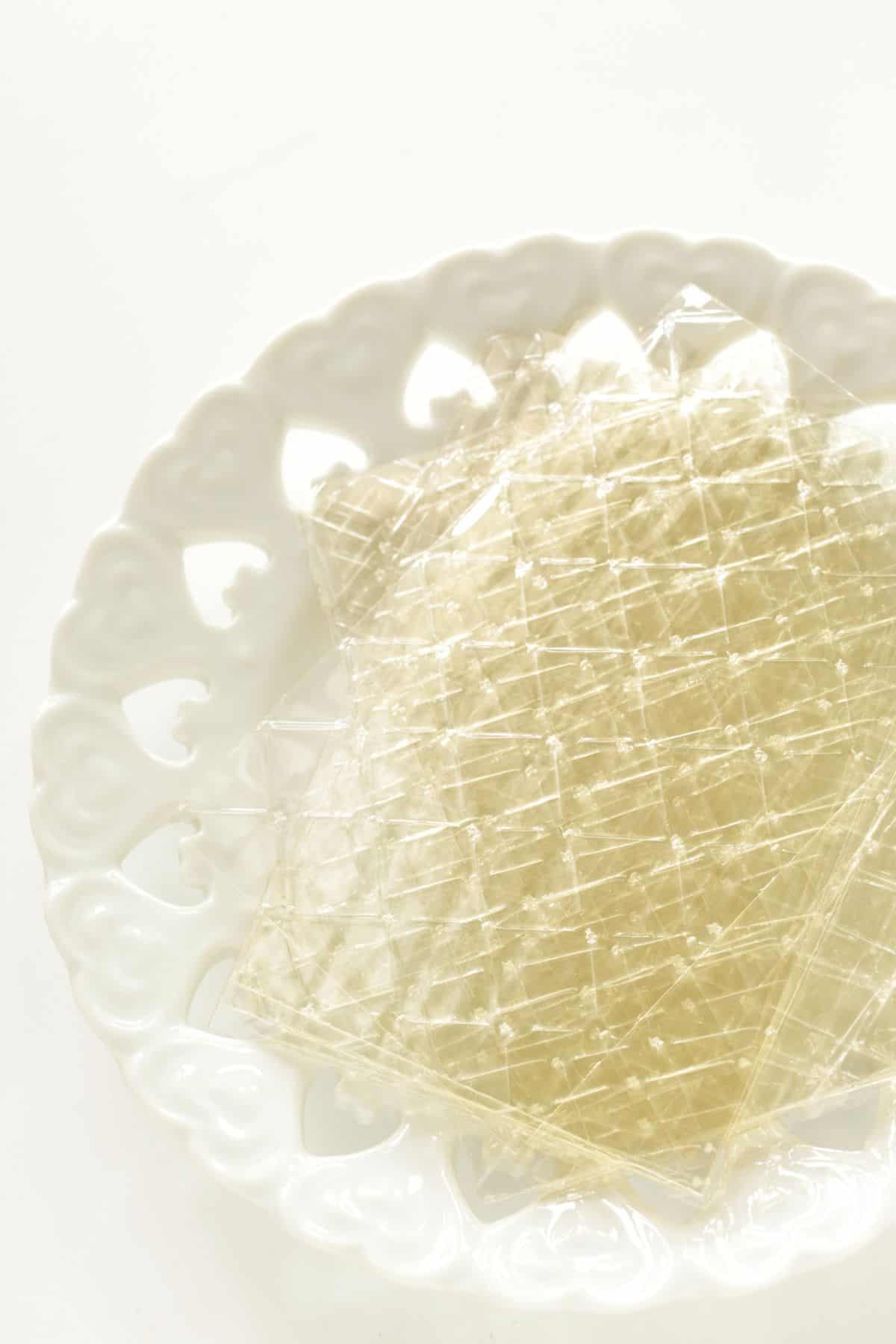
📖 What is agar agar used for?
Most commonly used in Asian cuisine, agar agar is a gelling, thickening, and texturing agent for baked goods, jellies, dressings, sauces, and even some soups. You'll often find it used in panna cotta, mousse cakes, jelly candies, gelatin desserts, marmalades or jelly fillings, and ice cream. It can also add more stability and structure to cream cheese in no bake cheesecake recipes!
As a natural product, it does not contain added sugars or fats, making it a healthier way to texture and thicken your favorite desserts and savory dishes. For vegans/vegetarians or those cooking or baking for vegans/vegetarians, agar agar powder is usually the go-to alternative.
🌟 When not to use agar agar?
While agar agar is an excellent and functional alternative, it isn't always suitable. Here are a few cases where you should not consider using agar agar in your recipe:
- You are in a hurry: Agar agar powder cannot be used as-is. Instead, the powder must first be mixed with water (or some other liquid), dissolved, brought to a boil, and then cooled down before you can use it. Therefore, if you're limited on time, there are better choices than agar agar powder.
- You expect the same texture as gelatin: While agar agar has the same overall purpose as gelatin, it does not give the exact results when it comes down to consistency. Agar agar has a much firmer texture, whereas gelatin is a bit creamier.
- You want a completely clear product: Agar agar powder has a slightly cloudy color. If a clear jelly is what you're going for, you will want to consider a substitute.
- You are making a recipe that contains citrus: Agar agar does not properly convert into a gel if mixed with citrusy or acidic liquids. In this case, it is best to consider an alternative.
- You have trouble swallowing: If you have any health issue that makes swallowing difficult, you will want to avoid agar agar. It could swell and block the esophagus if not taken with enough water or liquid.
👩🍳 What can I use instead of agar agar?
Luckily, there are several agar agar substitutes that you can use that will give you similar results without significantly changing the taste or texture. Even better news, you can use many of them in vegan and vegetarian products!
However, when considering an agar-agar substitute, it is best to consider the result you are going for, including overall taste, texture, and when you plan to serve the recipe. Here are several agar agar substitutes to consider:
- Cornstarch
- Arrowroot Powder
- Tapioca Starch
- Pectin Powder
- Xanthan Gum
- Guar Gum
- Carrageen Powder
- Vegan Jel
- Unflavored Gelatin
1. Cornstarch
So if you wonder, "Can I substitute agar agar with cornstarch?" the answer is yes! Cornstarch is your answer if you're looking for an agar agar substitute that is easy to find and doesn't require a calculator to figure out ratios. In fact, it is one of those ingredients that you likely already have sitting in your pantry!
Cornstarch is a flour-like, powdery starch made from the white endosperms of corn kernels. It is an incredibly versatile and an especially popular thickening agent in soups, sauces, and gravies.
Although it may not yield the same exact results as agar agar, it is one of the easiest to try. I highly recommend Argo 100% Pure Corn Starch, an excellent, tasteless thickener found in many grocery stores.
How to use it
- You can use cornstarch at a 1:1 ratio as an agar agar substitute.
- Once mixed (using water or another liquid), activate the cornstarch by bringing it to a boil for 1-2 minutes or until the mixture thickens.
You may consider using cornstarch sweet and savory sauces, jellies, and marmalades, soups and gravies.
Is corn starch vegan?
Yes. Cornstarch is simply the grounded product of the endosperm of corn kernels, a natural plant-based, and gluten-free food.
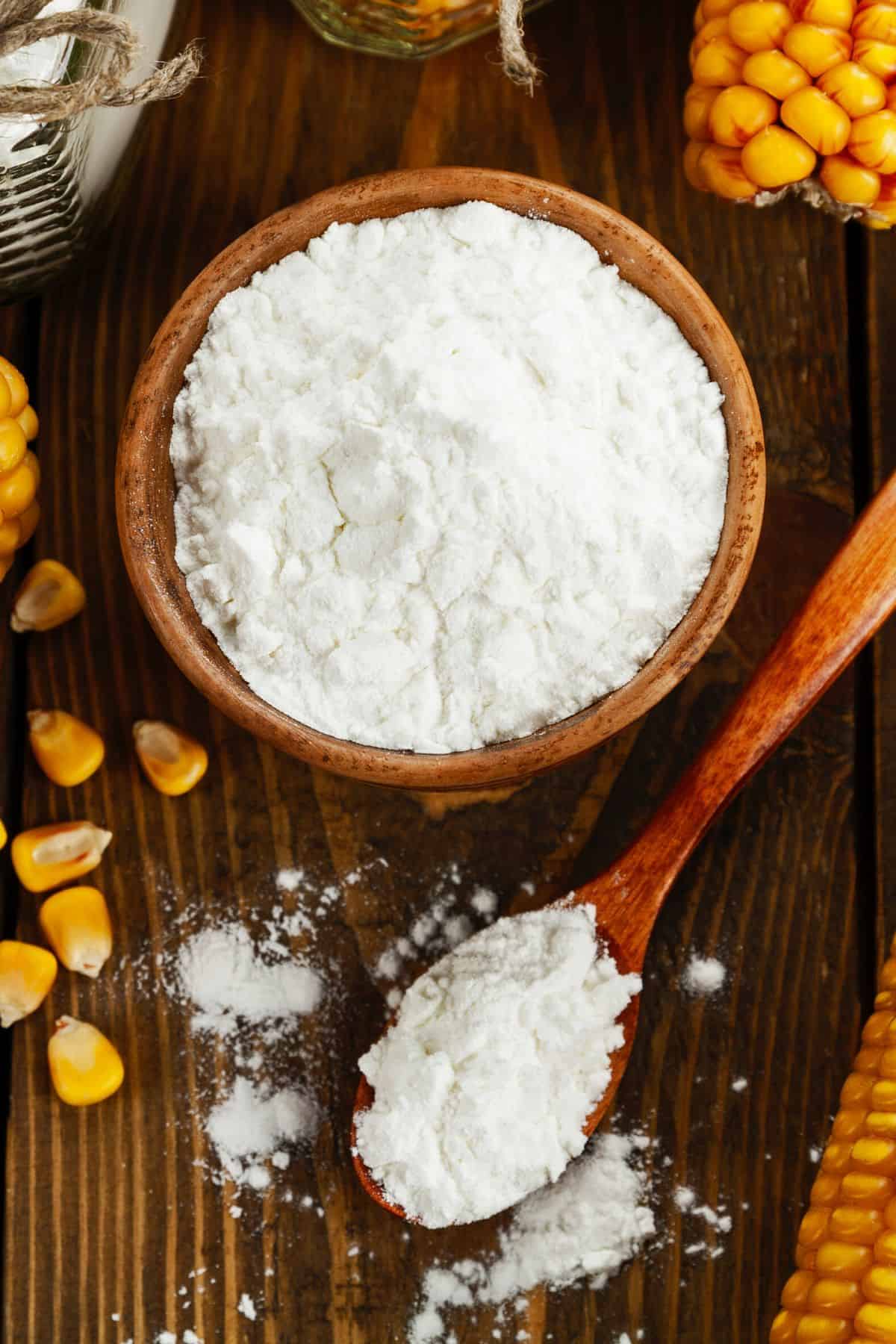
2. Arrowroot Powder
Arrowroot powder (also known as arrowroot flour or arrowroot starch) is a highly versatile, white, and flavorless powder. It is a common thickening agent in pie fillings, puddings, soups, and sauces.
Often used in place of cornstarch, it also makes an excellent agar agar substitute, especially for baked goods and stovetop recipes. Unlike agar agar powder, you can add arrowroot powder directly to your recipe.
You can find arrowroot powder in specialty stores (such as natural food and health food stores) and the gluten-free and baking supply aisles of your everyday grocery store. You can also easily find arrowroot powder online.
How to use it:
- Generally, you would use arrowroot powder as a 2:1 substitute for agar agar powder. However, depending on the recipe, you can experiment with the amount. You do not need to mix the powder with water first.
- For oven-baked goods, mix the powder with the recipe's dry ingredients before adding the liquid ingredients (which will activate the powder).
- For stovetop recipes, you would dissolve the powder with equal parts water to create a slurry.
Arrowroot powder is best in recipes such as sauces, gravies, and jellies when used as an agar agar replacement. However, it is important to note that it will produce thinner results in jelly recipes.
Is arrowroot powder vegan?
Yes. Arrowroot powder is a naturally vegan, gluten-free, and paleo-friendly powder.
3. Tapioca Starch
Like arrowroot powder, tapioca starch is a flavorless thickening agent commonly used in pie fillings, puddings, soups, and sauces. It is derived from the root of the cassava plant (also known as yuca), a South American root vegetable.
In the United States, tapioca starch is used interchangeably with tapioca flour. However, you will find a single Tapioca Flour/Starch product in some Caribbean and South American countries. This product is sold as cassava flour and gives an entirely different result than a clearly marked tapioca starch or flour.
You can usually find tapioca starch in the grocery store near the baking products or the specialty or gluten-free aisles. You can also find tapioca starch on Amazon.
How to use it:
- Use tapioca starch as a 2:1 agar agar substitute in cold desserts, baked goods, soups, and sauces.
- For baked goods, activate the powder by mixing the starch into the other dry ingredients of the recipe and then adding the wet ingredients.
- For sauces and soups, mix the starch with equal parts water to dissolve and create a slurry.
Tapioca starch as a thickening agent works well when mixed with dairy products. On the other hand, it is not a good idea to use it in recipes that contain citric or acidic ingredients, as it will not correctly stabilize. Like arrowroot, it is best for thickening recipes versus creating a gelatin consistency.
Is tapioca starch vegan?
Yes. Tapioca is a plant-based starch that comes from the cassava root, making it a gluten-free, vegan product.
4. Pectin Powder
Pectin is another gelling agent made from fruits, making it an excellent alternative for vegans and vegetarians. It can come in either a powder or a liquid form. When it comes to agar agar vs pectin ratio, you will need to use triple the amount of pectin than agar agar powder to start with and experiment after seeing the results.
You'll often find pectin as a gelling agent in fruity foods that involve fruit preserves, such as jams and gummy candies. Because it comes from citrus peels, it sometimes appears on labels as "fruit pectin." You can find pectin powder and liquid in your neighborhood grocery store and online. Pastry chefs often use NH Pectin, as you can melt and reset it as needed.
How to use it:
- Use pectin powder in a 3:1 ratio to agar agar powder.
- It is a good idea first to mix the powder with sugar to ensure even distribution.
Pectin powder is an excellent agar agar substitute for desserts and sweet recipes such as glazes, marmalades, jams, and jellies.
Is pectin vegan?
Yes. Pectin is a 100% plant-based product made from citrus fruit rinds. Pectin is one of the best vegan substitutes for agar agar that you can choose.
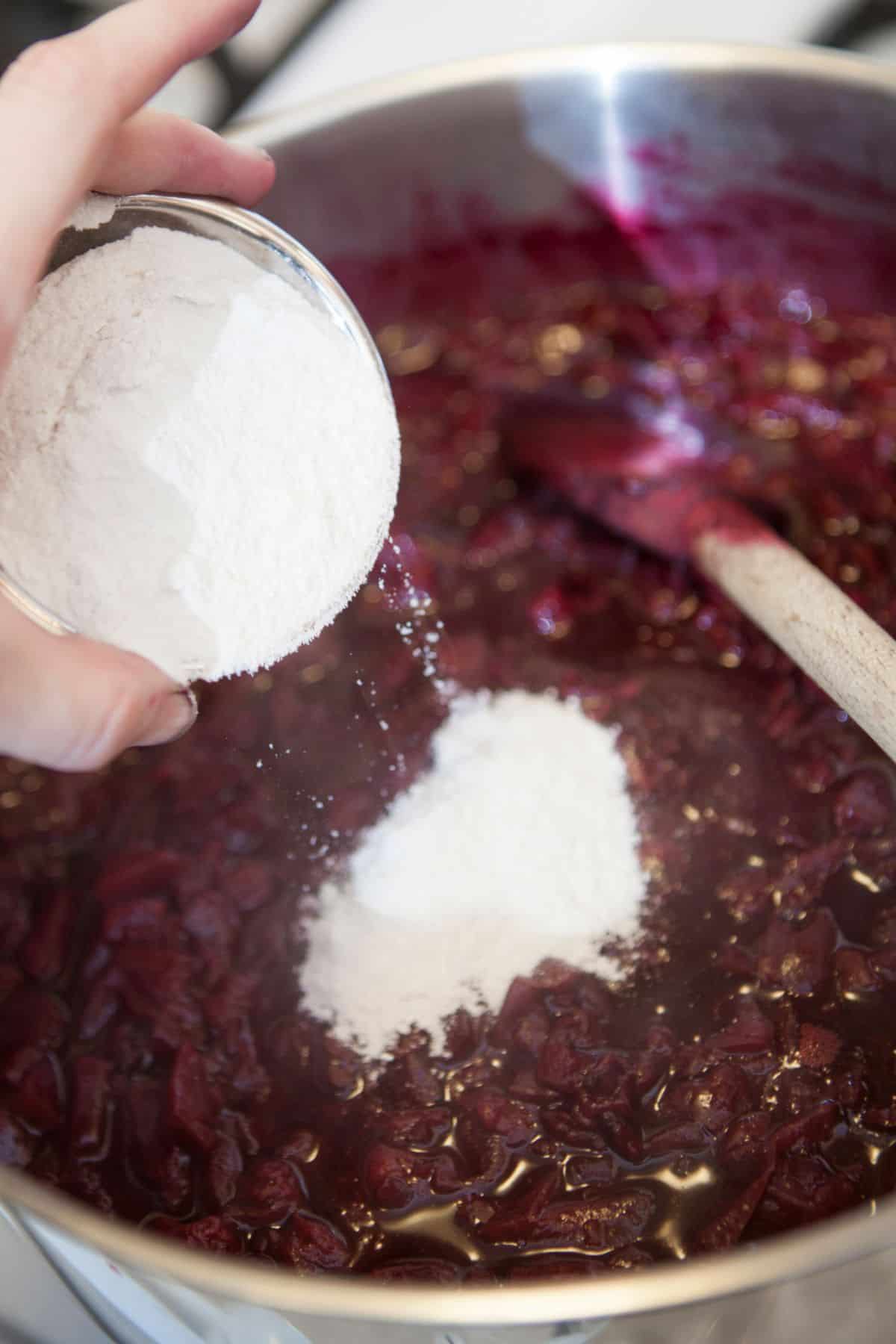
5. Xanthan Gum
Similar to agar agar, the primary function of Xanthan gum powder is to thicken, emulsify and stabilize recipe ingredients. Because of its texture-adding properties, it is a common food additive, especially in gluten-free baked goods that call for gelatin.
Xanthan gum is a lab-produced substance made by fermenting sugar with a bacteria called Xanthomonas campestris. The result is a gel-like substance that is then dried, processed, and turned into a powder. Created only in powder form, you can find Xanthan Gum in the baking aisle of your local grocery store or online.
It is important to note that Xanthan Gum is a soluble fiber that cannot break down in the body, which may cause issues for those with gut issues. Those with severe allergies to wheat, corn, soy, or dairy should also avoid it. However, Xanthan Gum is not known to have any long-term adverse effects on the body.
How to use it:
- You can easily swap in Xanthan Gum powder as a 1:1, equal agar agar substitute.
- Simply sprinkle, blend, or whisk it into the recipe that needs to be thickened!
Since Xanthan Gum is more used for its thickening and stabilizing properties than its gelling properties, it is best in recipes such as dressings, baked goods, soups, syrups, and sauces. On the other hand, it is not the best substitute for jelly-like recipes such as marmalades or gelatin desserts.
Is Xanthan gum vegan?
Yes. Although manufactured in a lab, Xanthan gum is made from plant-based sugar and bacteria that meet the requirements of vegan food.
6. Guar Gum
Made from the seeds of the Asian guar bean plant, Guar Gum is an off-white, flour-like powder and thickener. It serves a similar purpose as gelatin in baking, making it an excellent alternative for agar agar powder.
Guar gum is common in store-bought foods, and helps to bind and thicken the ingredients in baked goods. Unlike many other agar agar substitutes, you do not need heat to activate it. You can find guar gum in specialty food stores and online retailers such as Amazon.
How to use it:
- It takes very little guar gum to compensate for agar agar: Generally, just ½ tablespoon can compensate for an entire cup of agar agar powder but feel free to experiment.
- Use a sifter to add guar gum to your recipe's dry ingredients, which helps remove any clumps.
- Next, add your liquid ingredients to the dry ingredients, mix, and continue with the recipe as written.
It is best to use guar gum in recipes such as pie fillings, custards, jellies, sauces, and smoothies. In addition, it is great for ice creams and gluten-free baked goods such as cookies, cakes, muffins, and bread.
Is guar gum vegan?
Yes. Guar gum is made from the seeds of the guar bean plant, making it a vegan- and vegetarian-friendly agar agar substitute.
7. Carrageenan Powder
Made from Irish Moss, Carrageenan is a flavorless additive that thickens and stabilizes various foods and drinks. You will commonly find it in yogurt, nut milk, and meat products.
One of the perks of using carrageenan as an agar agar substitute is that it does not require heat to activate. One of the downsides is that it has been linked to some gastrointestinal issues. However, it has been deemed a safe and legal product in the USA. You can buy carrageenan from online retailers such as Amazon.
How to use it:
- Carrageenan is not an exact 1:1 substitute for agar agar powder. Depending on your recipe, it may take some experimentation to achieve the desired results.
- Use a blender to blend carrageenan into the liquid that needs to be thickened. If a blender is not available, a whisk will work.
Carrageenan is an especially excellent substitute for agar agar in vegan cheese and mousse. If you're looking for a great substitute for agar agar in cheesecake, carrageenan is your best bet. You can also use it as a substitute in soups, puddings, ice creams, creamers, and plant-based milk and cheeses.
Is carrageenan vegan?
Yes. Carrageenan is a 100% vegan product derived from natural red seaweed.
8. Vegan Jel
Vegan Jel (also known as Jel Dessert) is a vegan gelatin created to function like regular gelatin, making it an excellent agar powder substitute. Unlike the other substitutes, it is one product that contains several different ingredients. Most Vegan Jel options have the same outcome as a gelatin packet.
Depending on the brand, Vegan Jel may have a different name as well as varying ingredients. However, it is usually made with a blend of vegetable gum, tapioca dextrin, citric acid, calcium phosphate, and potassium citrate. The best place to find Vegan Jel is online and on Amazon. You can buy it either in a clear flavorless option or as a flavored "Jell-O."
How to use it:
- Activate the Vegan Jel by mixing the powder with boiling water (or as otherwise directed).
- Add it to your recipe and place it in the refrigerator to set and get firm.
It is best to use Vegan Jel as an agar agar substitute in recipes where gelatin plays a prominent role, such as Jell-O, Jell-O-based desserts, and marshmallows.
Is jello-o vegan?
Yes. Vegan Jel and Jell-O comes from 100% plant-based ingredients, making it a vegan-friendly product. However, it is always best to check the label to ensure it is a vegan product.
9. Unflavored Gelatin Powder
You wonder "Can I use gelatin instead of agar agar?" The answer is yes! If a vegan-friendly alternative is not critical, consider using unflavored gelatin as an agar agar substitute. It is one of the best and most easily accessible alternatives for agar agar powder.
Gelatin is a clear, flavorless protein used as a thickener, stabilizer, and binder in many recipes, including desserts, soups, and sauces. Gelatin comes in powder as well as in sheets.
You can find powdered gelatin in the baking aisle of the grocery store. You can also purchase it in specialty baking stores and online retailers such as Amazon.
How to use it:
- Agar agar is much stronger than gelatin powder so you will need to use approx. 8x more gelatin powder vs gelatin. Please check the pack as it often mentions instructions on how much to use.
- Bloom the gelatin powder as directed, then let the mixture cool slightly (not completely) before adding it to your recipe. Do not let it completely cool down, as the gelatin will set at room temperature. Read more about how to handle gelatin in my gelatin article.
Is gelatin powder vegan?
No. Unflavored gelatin comes from animal collagen ground into a white powder. Therefore, it is unsuitable for vegans or those who cook for them.
❓ Agar agar alternatives FAQs
Agar agar has a very similar function to gelatin in that it thickens and creates a gel-like texture to various baked and cooked products. However, agar agar is ideal for vegans and recipes that require a jelly consistency versus a creamy consistency. Also, agar agar is much stronger than gelatin and you will need to use significantly less when substituting gelatin. Always check the recommendation on the package.
I recommend pectin powder, xanthan gum, corn starch, or unflavored gelatin powder for the most favorable results but it depends on the recipe whether better thickening or jellying property is required.
For the most straightforward conversion, it is best to substitute agar agar powder with gelatin powder. You will have to do some math if you'd rather substitute gelatin sheets versus gelatin powder in place of agar agar powder. Learn more about gelatin sheets in my gelatin article.
To maintain the highest quality, place agar agar in a cool, dry place within an airtight container.
Agar agar powder has a long shelf life. When stored properly, it will not spoil.
🎓 Conclusions on the best substitute for agar agar
When it comes to finding the best substitute for agar agar there are a few things to think about:
- The purpose of the agar agar in your recipe
- The desired texture and color
- The time available to make the recipe, and
- Any dietary restrictions or health issues
As each type of ingredient serves its particular purpose, no substitute will have the same exact results as agar agar. However, part of the fun in trying new recipes and alternatives comes with experimentation and finding what works best for you.
Thankfully, there are several excellent options to choose from. And with all of the above options, you'll no doubt find one to help you create the perfect sweet or savory creation without sacrificing quality or flavor!
More baking guides
- The Best Moist Sponge Cake Recipe
- Flaky Pie Crust
- 25+ Different Types Of Frosting For Cakes and Cupcakes
- How To Pasteurize Eggs For Tiramisu, Ceasar Salad Dressing, Any Sauce and More
- 1-Minute Egg Wash Recipe For Pies, Puff Pastry, Bread, and More
- Why Are My Cookies Flat? Learn How To Fix Them!
- Chocolate Buttercream Frosting
- Raspberry Cream Cheese Frosting
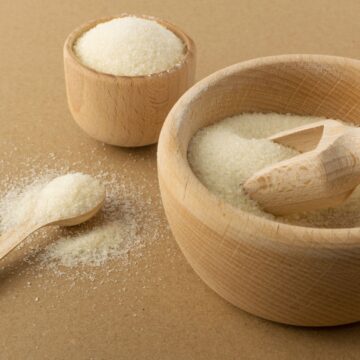
The BEST Agar Agar Substitute
Best subsitute for agar agar
- ⅛ teaspoon unflavored gelatin powder
- 3 teaspoon pectin powder
- 1 teaspoon xanthan gum
- 1 teaspoon corn starch
Instructions
- replace 1 teaspoon agar agar either with ⅛ teaspoon gelatin powder, or 3 teaspoons pectin powder, or 1 teaspoon xanthan gum, or 1 teaspoon cornstarch
Note
- Arrowroot Powder
- Tapioca Starch
- Guar Gum
- Carrageen Powder
- Vegan Jel




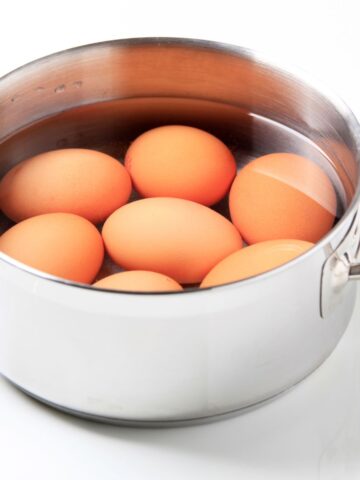

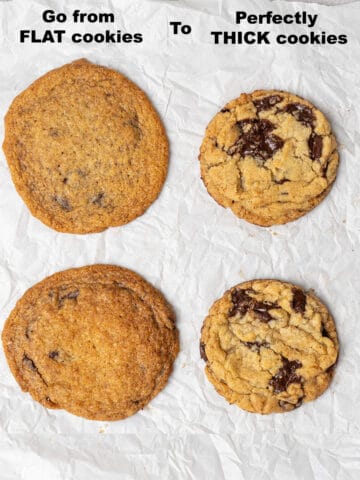


Leave a Reply